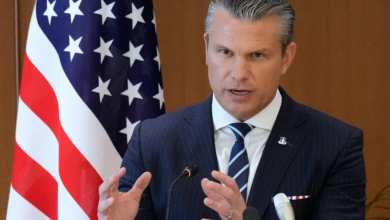Repsol’s Bad Time in Latin America
Environmental problems and a fight against the Mexican president. Repsol is facing a difficult scenario in Latin America.

Photo: Carlos Reyes/AFP
LatinAmerican Post | Santiago Gómez Hernández
Repsol is one of the most important Spanish companies in terms of size and turnover. This company located in Madrid in 1987 is dedicated to the energy and oil industry, has a presence in 29 countries and since 2020 it is ranked 645th among the most important companies in the world. It is one of the main economic engines of Spain, but for some time, it has been presenting problems in Latin America.
Environmental problems in Peru
Since January 15, when a spill of more than 10,000 barrels of oil occurred off the coast of Ventanilla in Peru, Repsol has been going through a legal process in the Inca country. The incident occurred, according to the Peruvian Ministry of the Environment, due to strong waves caused by the eruption of an underwater volcano in Tonga, on the other side of the Pacific.
The Prime Minister, Mirtha Vásquez, assured that her Government will seek to sanction the multinational that owns the refinery from which the oil that ended up in the water came from if some irregularity was committed.
Vásquez did not even rule out the possibility of suspending the operations of the refinery, at the request of some political parties. But the consequences for the Spaniards can even reach expropriation, all this due to the discomfort that this accident left in Peruvian society.
The politician, a member of President Pedro Castillo’s cabinet, told RPP radio that the decision “will depend a lot on the evaluation we make of the legal terms under which the company is operating and what type of sanctions or infractions were committed.”
#ESTENDENCIA • Jaime Fernández-Cuesta
Por la entrevista de este domingo al presidente de Repsol Perú en #PuntoFinal. pic.twitter.com/pbs0AVPXyw— La Tendencia ?? (@latendenciape) January 24, 2022
Repsol excuses itself in that the main responsible is the ship in which was transporting the oil and therefore would initiate legal action against the Italian shipping company Fratelli d’Amico, owner of the Mare Doricum ship. This was announced by the Spanish company in a press release.
However, the Minister of the Environment, Modesto Montoya, assured that “here the Repsol is directly responsible and if they hired a third party to transport the fuel, that is their problem. Repsol has to pay for the consequences of this disaster.”
Also read: Beyond GEA and Gilinski: Colombian Economic Conglomerates
The Peruvian authorities catalog this event, as the worst ecological disaster in the recent history of the country and estimate a damage of about 18,000 square kilometers of protected areas with their fauna and flora.
For now, Repsol has already made a mea culpa and admits that it did not realize the size of the disaster. Jaime Fernández-Cuesta, president of the company in Peru, classified it as a “misperception” about the magnitude of the spill. “Surely we have made mistakes, the issue of the amount reported in a preliminary report, not having been able to see that there were oil slicks in the sea until the next day,” Fernández-Cuesta said on the Punto Final television program. Peruvian.
Political problems in Mexico
While the situation in the south of the continent is complicated and could represent great losses for the Spanish multinational, in Mexico it also maintains a dispute with the Government of Andrés Manuel López Obrador.
A few days ago, the Mexican president questioned the concession to Repsol of a contract to extract gas in the Burgos Basin that had been awarded several years ago at extremely high prices and without results. AMLO questions several contracts that the company signed with its predecessors. Already in 2020, López Obrador assured that “the government of Calderón (president of Mexico from 2006 to 2012) had Repsol as a favorite contractor company, which if a technical or administrative audit is carried out, it would be found that the hacienda was looted public”, all this to the detriment of the state-owned Pemex.
“Empresas como @iberdrola y @Repsol durante el periodo neoliberal tenían contratos leoninos y ya no aceptar que nos roben y aparte contrataban a políticos”, dijo el presidente @lopezobrador_ @Notimex @Notimex_TV pic.twitter.com/eN552EeYYL
— Agustín Lozano (@tinlozano1) February 16, 2022
This is why the Mexican president called for a pause in relations with Spain, due to what he considers “an exploitation” of Mexico by Iberian authorities and companies. “They were like owners of Mexico,” explains AMLO.
However, and despite the bad times that Repsol is experiencing in Latin America, today, the company’s shares are at their highest point in months. Although this may also be leveraged by the increase in oil prices due to the crisis in Ukraine.




